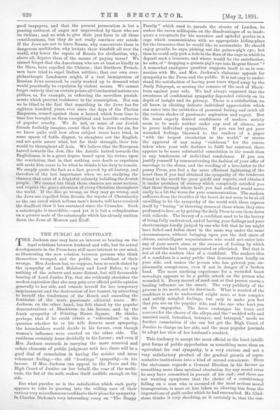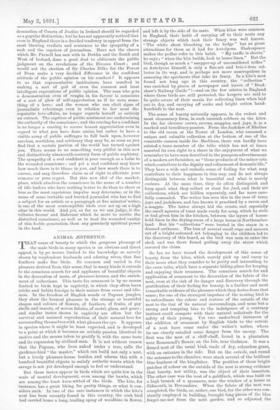THE PUBLIC AS CONFIDANT.
THE Jackson case may have an interest as bearing on the legal relations between husband and wife, but its actual developments in the Press have still more interest to our mind, as illustrating the new relation between persons who think themselves wronged, and the public as confidant of their wrongs. Mrs. Jackson has, we suPi)ose, been so much elated by the sympathy of Lord Halsbury and Lord Esher, to say nothing of the soberer and more distant, but still favourable bearing of Lord Justice Fry, that she evidently cherishes the modest aspiration that she may gain over official public opinion generally to her side, and console herself for her temporary imprisonment and the destruction of her bonnet, by attracting to herself the tenderness of the Bench and unsealing the fountains of the more passionate editorial tears. Mr. Jackson, on the other hand, has felt elated by the popular demonstrations at Blackburn in his favour, and by the frank sympathy of Printing House Square. He thinks, perhaps, that if he could obtain a " referendum " on the question whether he or his wife deserve most sympathy, the householders would decide in his favour, even though women's influence were exerted on the other side. The residuum certainly leans decidedly in his favour ; and even if Mrs. Jackson succeeds in carrying the more reserved and sedate elements of public judgment with her, there will be a good deal of consolation in having the noisier and more vehement feeling,—the old " hustings " sympathy,—in his favour. If Mrs. Jackson can appeal to the Press and the High Court of Justice on her behalf, the roar of the multi- tude, the fiat of the mob, makes itself audible enough on his side.
But what puzzles us is the satisfaction which each party appears to take in pouring into the willing ears of their various very miscellaneous confidants their pleas for sympathy. In Charles Dickens's very interesting essay on "The Happy, Family" which used to parade the streets of London, he makes the raven soliloquise on the disadvantages of so inade- quate a receptacle for his secretive and spiteful genius as a cage which communicates with no appropriate hiding-place for the treasures that he would like to accumulate. He should enjoy greatly, he says, picking out the guinea-pig's eye; but then he could only pick a hole in the floor of the cage in which to deposit such a treasure, and where would be the satisfaction, he asks, of "dropping a guinea-pig's eye into Regent Street " ? A somewhat analogous question suggests itself to us in con- nection with Mr. and Mrs. Jackson's elaborate appeals for sympathy to the Press and the public. It is not easy to under- stand the satisfaction of having your tears wiped away by the Daily Telegraph, or scoring the censure of the mob of Black- burn against your wife. We had always supposed that the sweetness of confidential sympathy depended entirely on its depth of insight and its privacy. There is a satisfaction, we all know, in eliciting delicate individual appreciation which can enter into the subtleties of personal feeling and catch all the various shades of passionate aspiration and regret. But the most eagerly desired confidences of modern society seem to be made neither under any seal of silence, nor to prove individual sympathies. If you can but get your wounded feelings blazoned to the readers of a paper "with the largest circulation in the world," or secure the approval of any noisy " residuum " for the course taken when your wife declines to fulfil her contract, there appears to be more substantial consolation in the result than in any tenderness of individual condolence, if you can justify yourself by communicating the fashion of your offer of marriage to the slums, and the wording of a love-letter to the penny Press, you feel a far more effectual lightening of the heart than if you had obtained the sympathy of the tenderest friend in the world for your griefs and regrets, and obtained it under promises of secrecy which completely satisfied you that those through whose fault you had suffered would never really be a bit the worse for your communication. The modern sufferers from the troubles of the heart do not seem to be at all unwilling to let the sympathy of the world with them express itself by " booing " or throwing stones at those whom they once professed to love, or by getting the daily Press to run them down with ridicule. The luxury of a confidant used to be the luxury of being fully understood, and of having your failings and your shortcomings kindly judged by one who felt that he too might have failed and fallen short in the same way under the same circumstances, without bringing upon you the dull stare of obtuse, unintelligent acquaintances who could not enter into any of your secret aims, or the nuances of feeling by which your troubles had been aggravated or alleviated. But that is not at all the modern idea of a confidant. The modern idea of a confidant is a noisy public that demonstrates loudly on your side, and makes the person who has grieved you un- pleasantly conspicuous, even if not in danger of a broken head. The most soothing experience for a wounded heart nowadays appears to be a public attack on the person who wounded it. Every morsel of mud cast at that person exerts a healing influence on the smart. The very publicity of the process is its merit, not its drawback. What is wanted of the confidant is not to understand aright more or less complex and subtly mingled feelings, but only to make you feel that you are on the popular aide, and the one who hurt you. on the unpopular. The lover exchanges his tears and sorrows for the cheers of the alleys, and the "wedded wife and married maid, betrothed, betrayer, and betrayed," needs no further consolation if she can but get the High Court of Justice to charge on her side, and the most popular journals to adopt her view of her husband's conduct.
This tendency to accept the most official or the least intelli- gent forms of public approbation as something more than an equivalent for real sympathy, is a very curious and not a very satisfactory product of the gradual growth of repre- sentative institutions into a kind of second conscience. Even the statesman regards a General Election in his favour as something more than spiritual absolution for any moral error he may have committed in pursuit of his end ; and there are not wanting symptoms that the choice of a constituency falling on a man who is- accused of the most serious moral transgression, is more or less taken as clearing him from the imputations of guilt under which he had succumbed. Mr. Glad- stone thinks it very shocking, as it certainly is, that the con- demnation of Courts of Justice in Ireland should be regarded as a popular distinction; but he has not apparently noticed that even in England there is a decided tendency to appeal from the most blasting verdicts and sentences to the sympathy of a mob and the caprices of journalism. Have not the cheers which Mr. Parnell has met with in Dublin and the South and West of Ireland, done a good deal to obliterate the public judgment on the revelations of the Divorce Court ; and would not the election of Sir Charles Dilke for the Forest of Dean make a very decided difference in the confident attitude of the public opinion on his conduct ? It appears to us that representative institutions have resulted in making a sort of god of even the coarsest and least intelligent expressions of public opinion. The man who gets a demonstration even of roughs in his favour is conscious of a sort of glow of self-approbation as if he were some- thing of a hero ; and the woman who can elicit signs of journalistic relentings even in relation to her most dis- reputable love-affairs, no longer regards herself as entirely an outcast. The caprices of public sentiment are undermining the authority of the conscience; and the craving fora confidant is no longer a craving to secure honest appreciation even in regard to what you have done amiss, but rather to have a visible array of public suffrages to fall back upon, however careless, worthless, and arbitrary they may be, so soon as you find that a certain portion of the world has turned against you. There seems to us something very pitiful in this new and distinctively nineteenth-century form of public sophistry. The sympathy of a real confidant is poor enough as a balm to the wounded conscience ; and yet a real confidant may know how much there is to blame in you, and how much there is to "excuse, and may therefore claim as of right to alleviate your remorse or your regret. But this new idol of the market- place, which absolves the conscience in the name of a number of idle loafers who have nothing better to do than to cheer or hiss as the most capricious impulse may determine, or in the name of some irritable and hurried journalist who has to find a subject for an article or a paragraph at five minutes' notice, is one of the most contemptible idols ever set up on a high altar in this world. And yet, so far as we can judge, it dis- tributes favour and disfavour which do more to soothe the disturbed conscience, as well as to heal the wounded vanity, of this feeble generation, than any genuinely spiritual power in the land.







































 Previous page
Previous page